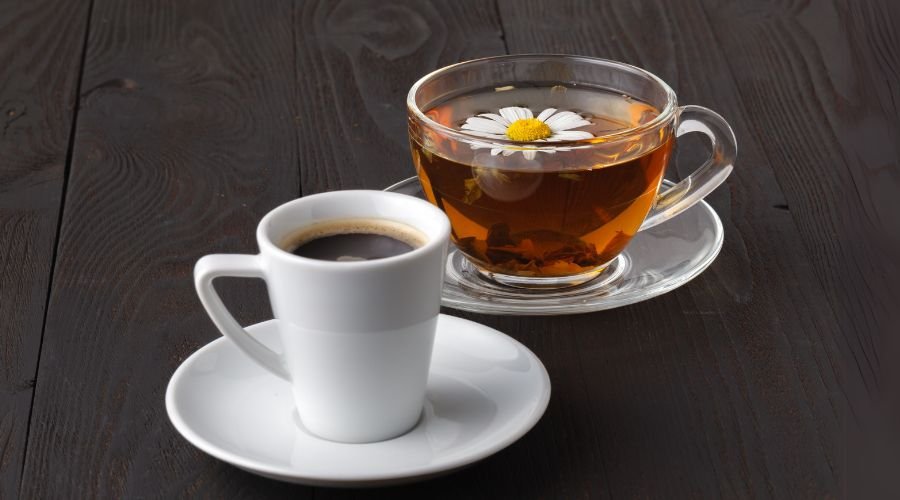For many of us, starting the day without a hot cup of coffee or tea is unthinkable. These beloved beverages fuel our mornings, provide a calming ritual, and bring comfort throughout the day. But if you’ve ever glanced in the mirror and noticed your smile looking a little less bright, you may have wondered: what are coffee and tea really doing to my teeth?
The truth is, while coffee and tea can offer plenty of health perks, they also come with some drawbacks when it comes to your oral health. Let’s break it down in a friendly, honest way so you can enjoy your drinks while still protecting your smile.
How Coffee Affects Your Teeth
Coffee is one of the world’s favorite drinks, but it’s not always kind to teeth. Here’s what happens when you sip your daily latte or long black:
- Staining: Coffee contains tannins, a type of polyphenol that makes color compounds stick to your enamel. This is what causes yellow or brown discoloration over time.
- Acidity: Coffee is acidic, and that acidity weakens enamel. Thin enamel makes teeth more vulnerable to decay and sensitivity.
- Dry Mouth: Coffee can reduce saliva production, which is essential for washing away bacteria and neutralizing acids.
That said, it’s not all bad news. Coffee in moderation has been linked to health benefits such as improved mood, better focus, and even antioxidants that support your body’s overall health. The trick is balance and mindful habits.
How Tea Affects Your Teeth
Tea is often considered a healthier alternative, but it has its own impact on oral health:
- Staining: Just like coffee, tea—especially black tea—contains tannins that stain teeth. In fact, tea can sometimes cause even more noticeable discoloration than coffee.
- Acidity: Some teas, such as fruit and herbal blends, can be surprisingly acidic. Over time, that acidity erodes enamel.
- Potential Benefits: On the positive side, tea (particularly green tea) contains compounds that may help reduce bacteria and inflammation in the mouth, promoting healthier gums.
So, while tea offers some protective benefits, it can still dull your smile without proper care.
Coffee vs. Tea: Which Is Worse for Your Smile?
If we’re comparing strictly on tooth health, tea might actually cause more staining than coffee, even though many people assume it’s the gentler choice. Coffee tends to be more acidic, while tea can cling more stubbornly to enamel. The result? Both can leave you with yellowing teeth if consumed regularly.
The good news is, you don’t need to give up your favorite beverage. Instead, understanding how they affect your smile empowers you to take the right steps to protect it.
Tips to Protect Your Smile Without Giving Up Your Favorite Drink
Here are some simple, practical tips to enjoy coffee and tea while keeping your teeth bright and healthy:
- Rinse with Water: After drinking, swish plain water around your mouth to wash away tannins and acids.
- Use a Straw: Drinking through a straw helps reduce direct contact with your front teeth.
- Don’t Brush Immediately: Brushing right after drinking something acidic can damage enamel. Wait at least 30 minutes.
- Practice Good Oral Hygiene: Brush twice a day, floss daily, and consider a whitening toothpaste.
- Regular Dental Visits: Professional cleanings help remove stains and catch issues early.
The Role of Professional Dental Care
At-home habits go a long way, but nothing beats professional dental care for maintaining a bright, healthy smile. Dentists can perform deep cleanings, polish away stubborn stains, and offer safe whitening treatments that are far more effective than over-the-counter products.
If you’re concerned about staining or sensitivity from your daily coffee or tea habit, speaking with a trusted dental professional can give you peace of mind and a customized plan for your oral health.
For example, if you’re in Melbourne, you can book a consultation with a St Kilda Dentist to explore options for stain removal, whitening treatments, or protective care tailored to your needs.
Whitening Options: What Works and What Doesn’t
The internet is full of DIY whitening hacks—baking soda scrubs, lemon juice rinses, or charcoal powders—but many of these can do more harm than good. Abrasive or acidic remedies may whiten temporarily, but they often wear away enamel in the process.
Professional whitening treatments, on the other hand, are designed to safely lift stains without damaging your teeth. In-office whitening can brighten your smile by several shades in just one session, while take-home trays from your dentist offer a more gradual option.
For those seeking expert advice, booking an appointment with a Dentist St Kilda is a smart step toward safe, long-lasting results.
Can You Prevent Stains Altogether?
Completely avoiding stains from coffee and tea isn’t realistic for most people. However, prevention is all about small, consistent habits:
- Drink water alongside your beverage.
- Limit sipping throughout the day—shorter exposure is better.
- Choose lighter teas or add milk to coffee and tea to reduce staining intensity.
- Stick to regular dental check-ups and cleanings.
The Bigger Picture: Oral Health Beyond Stains
While staining is the most obvious effect of coffee and tea, don’t forget about gum health, enamel strength, and overall oral hygiene. These beverages can play a role in acidity and dryness, both of which affect more than just tooth color. Staying mindful of your full oral care routine ensures your smile stays healthy, strong, and bright for years to come.
Final Thoughts
Coffee and tea bring joy to millions of people every day, and the truth is you don’t need to give them up to maintain a beautiful smile. With simple habits—like rinsing with water, using a straw, and keeping up with professional dental care—you can enjoy your favorite drinks guilt-free.
Your smile is one of your most powerful assets. Treat it with care, and it will shine as brightly as your morning cup of coffee or calming evening tea.

